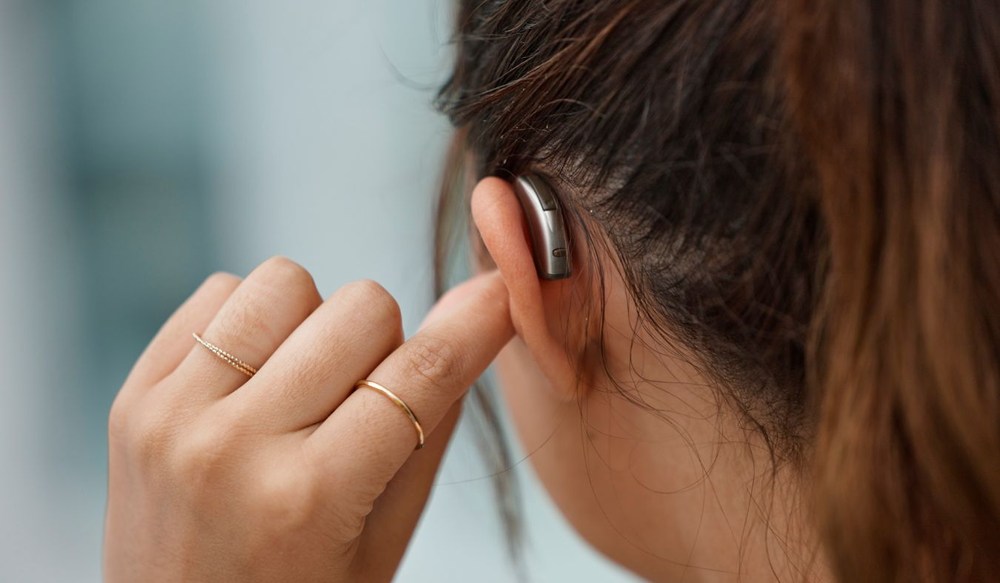How Long Does it Take to Adjust to New Hearing Aids?
When you first get hearing aids, one of the biggest questions on your mind
Call (844) 958-5304 to schedule today!

By: admin | March 21, 2025
Despite how common hearing loss is, many people who could benefit from hearing aids don’t use them. On average, people wait seven years from when they first notice hearing difficulties to when they seek help. This delay often stems from misconceptions about hearing loss and treatment options. Some worry about appearing older, while others have concerns about cost or believe their hearing “isn’t bad enough” to need attention. These barriers keep millions of Americans from addressing a health issue that affects their daily communication and connections with others.
Myths about hearing health and hearing aids are everywhere, and they can stop you from taking steps toward better hearing. Maybe you’ve heard that hearing aids are bulky and obvious, that they make everything too loud or that hearing loss is just something you have to live with as you age. These mistaken beliefs can make the decision to seek help feel harder than it needs to be. By sorting fact from fiction, we can help you make informed choices about your hearing health without unnecessary delays or hesitations that might keep you from experiencing all the sounds that matter in your life.
First, let’s address some important facts about hearing health. It’s a common misconception that hearing loss only affects the elderly. This is not true. People of all ages can experience changes in their hearing, so regular check-ups with a hearing specialist are important for everyone.
Loud noises aren’t the only cause of hearing loss. Other factors like genetics and certain medical conditions can also contribute. Being aware of these risks and taking preventative measures is essential.
Also, it’s important to note that even minor issues with hearing shouldn’t be dismissed as trivial. Even slight changes can significantly impact daily life and overall health. Promptly addressing any concerns with a professional in the field of hearing health is the best action to take. Early detection and appropriate care can help you effectively manage your hearing health for years to come.
It’s time to debunk the first myth: that hearing loss is only for the elderly. This is far from the truth. Hearing loss does not discriminate by age. Recent studies show a significant number of young adults and even children are experiencing some degree of hearing loss.
Your ears can be affected by various factors beyond age, including exposure to loud noises, certain medical conditions and even genetics. It’s important for people of all ages to take proactive steps in maintaining their hearing health.
This includes regular check-ups with a hearing specialist and being mindful of noise exposure levels daily. Early detection can play a significant role in managing and preventing further hearing loss effectively – regardless of age. So, let’s debunk this myth: Hearing loss is not just an ‘old person’s’ issue; it affects individuals across all age groups.
Knowing how to recognize hearing loss in different age groups is important:
The next misconception to address is the belief that loud music is the only cause of hearing loss. This idea, while partially true, doesn’t provide the full picture.
Secondly, certain medical conditions can also impact your hearing. Conditions like diabetes or high blood pressure can affect the small blood vessels in your ears, leading to potential issues with your hearing over time.
Lastly, while we’ve already discussed noise exposure as a factor, it’s not just about loud music or concerts. Industrial noise at work and even everyday sounds from household appliances can contribute to gradual changes in your hearing.
Many people assume that being able to hear some sounds means their hearing is perfectly fine. They think, “If I can hear a car honking or a dog barking, then my ears must be working well.” However, this is not necessarily true. Hearing loss often occurs gradually and may only affect certain frequencies at first. This means you might still be able to hear lower-pitched sounds like a car horn but struggle with higher-pitched ones like the ringing of a telephone.
Partial sound perception does not equate to good hearing health. If you find yourself frequently asking others to repeat themselves or struggling to follow conversations in noisy environments, it might be time for a check-up with your hearing specialist. Early detection and treatment are key for maintaining optimal hearing health over time. Don’t let this myth deter you from getting the care you need!
Understanding the range of hearing capabilities is important. Our ears can perceive a wide spectrum of sounds, from the softest whispers to the loudest roars. This vast range is measured in decibels (dBs), with 0 dBs representing the softest sound that a healthy human ear can detect.
However, hearing isn’t just about volume; it also involves frequency or pitch. The human ear can typically hear frequencies ranging from 20 Hz (very low-pitched sounds) up to 20,000 Hz (very high-pitched sounds). But it’s not uncommon for people to struggle with certain frequencies while others remain clear. This is why two people with hearing loss might experience it very differently.
Understanding this broad range of hearing capabilities helps explain why some sounds may be harder for you to pick up than others. If you’re noticing difficulties in perceiving certain volumes or pitches, don’t hesitate to discuss these concerns with your hearing specialist. They can help pinpoint any issues and guide you towards solutions tailored specifically for your needs.
Another common misconception is that using hearing aids is synonymous with having a serious condition. This idea often deters many from seeking the help they need, out of fear or embarrassment. However, this couldn’t be further from the truth.
Hearing aids are not markers of severe health problems. They are simply tools designed to assist those with hearing loss in better managing their day-to-day lives. Just like glasses aid in improving vision, hearing aids help enhance sound perception for those experiencing changes in their hearing.
Hearing aids are small devices that can make a big difference in your life, especially if you’re dealing with hearing loss. They work by amplifying sounds around you, making it easier for you to pick up on conversations, listen to music or simply enjoy the sounds of nature.
One major advantage of hearing aids is their ability to improve your quality of life. With enhanced sound perception, daily tasks become less challenging and more enjoyable. Whether it’s chatting with friends over lunch or watching your favorite show on TV, hearing aids can help ensure you don’t miss out on any part of the conversation or action.
These devices can also promote better mental health. Struggling with hearing loss can sometimes lead to feelings of isolation or frustration. But with the support of hearing aids, these challenges become more manageable – enabling clearer communication and fostering better connections with those around you.
Don’t underestimate the power and potential benefits that come along with using hearing aids. They play an essential role in managing changes in your hearing health and provide numerous advantages that extend far beyond improved sound perception alone.
A widespread misconception is that all instances of hearing loss are permanent. This idea can often lead to feelings of despair and resignation among those experiencing changes in their hearing. However, it’s important to understand that this is not always the case.
Not all types of hearing loss are irreversible. Some forms can be temporary and may improve over time or with appropriate treatment. For instance, conductive hearing loss – often caused by blockages like earwax build-up or fluid from an ear infection – is usually temporary and can often be resolved with medical intervention.
If you’re noticing changes in your hearing, don’t jump to conclusions. It’s important to get checked by a professional who can accurately diagnose the issue and guide you through the next steps for managing your hearing health effectively. Not all hearing loss is permanent – sometimes it’s just a bump in the road on your path towards maintaining good auditory health.
Different types of hearing loss require different treatments. The type of care you receive will depend on the specific nature of your hearing loss.
For instance, sensorineural hearing loss, often due to damage in your inner ear or nerve pathways from your ear to your brain, might be managed with devices like hearing aids or cochlear implants. These tools work by amplifying sounds or bypassing damaged parts of the ear to deliver sound signals directly to your auditory nerve.
On the other hand, conductive hearing loss caused by blockages like excessive earwax or fluid buildup can often be resolved with medical intervention such as medication or minor procedures.
In some cases where hearing aids aren’t enough and medical treatment isn’t an option, surgical procedures may also be considered. The key takeaway here is that there are numerous treatment options available depending on your specific situation and needs. A consultation with a hearing specialist can help identify what approach would work best for you in managing your unique type of hearing loss effectively.
Understanding the truth about hearing loss and hearing aids can make all the difference in how you approach your hearing health. Modern hearing technology is more advanced, comfortable, and discreet than ever before, and addressing hearing challenges early can improve everything from conversations with loved ones to overall well-being. The longer you wait, the more you miss – but by setting aside outdated misconceptions, you can take a step toward clearer, more effortless hearing.
If you have any concerns about your hearing or need professional advice on managing it effectively, don’t hesitate to reach out for help. At Home Hearing Healthcare in Pembroke, MA is committed to providing personalized care tailored specifically to meet your unique needs. Give us a call at (844) 958-5304 to schedule your appointment today.

When you first get hearing aids, one of the biggest questions on your mind
By: admin | February 20, 2026

As 5G wireless networks continue to expand, they are influencing how we
By: admin | December 21, 2025

Your hearing needs change dramatically throughout a typical day. The
By: admin | August 21, 2025
